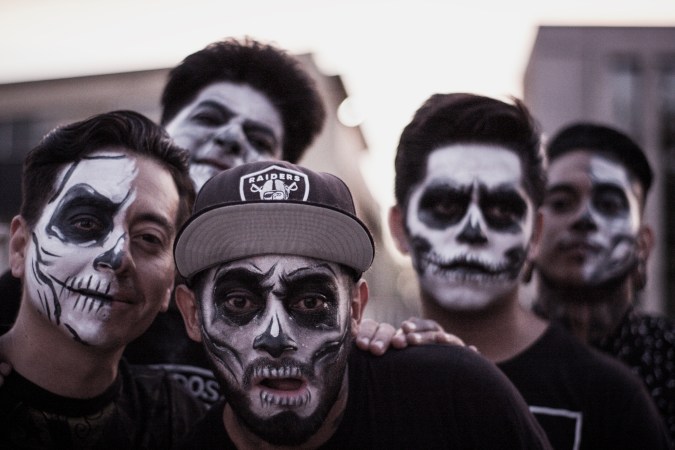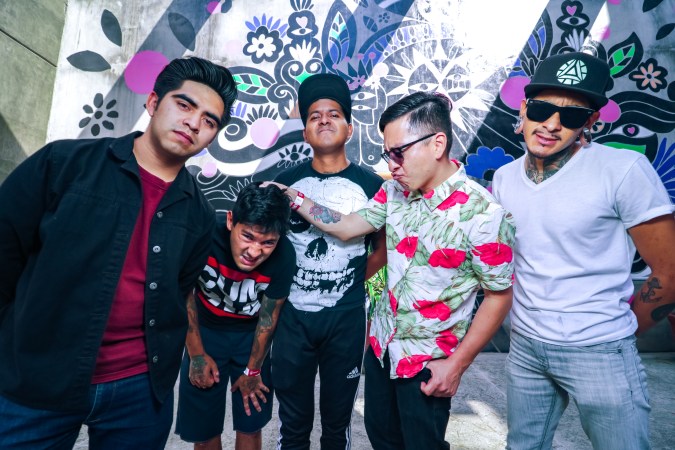A crowd gathered around the young men playing the marimbas, sweating in their studded leather jackets, the exaggerated pompadours of their flat top quiff hairstyles bobbing. The antiques section of Mercado de Lagunilla is one of the best places to get drunk on towering micheladas in Mexico City, and that’s where the Gama brothers of Son Rompe Pera had gone with their friends on that fateful day in 2013. Once appropriately wasted, their posse started begging them to jump on the marimbas that some older street musicians had brought to the tianguis.
Kacho, Kilos and Mongo Gama had been taught by their father to play anywhere—at weddings, birthday parties and most definitely in the street. And that day, they obliged. This is how tour manager and booking agent Timothy “Timo” Bisig first saw them, Kilos on the güiro and Kacho and Mongo on the marimba.
“When the old guys finished a song, two of the punks left the group and started making their way to the marimba,” Bisig remembers. “They asked for their mallets, and then laid down an amazing punky cumbia on the old instrument like I had never heard before. I was stunned.”
“Cumbia is like punk,” Mongo later reflected. “It’s barrio, it’s of the working class, it’s of people who have dreams.”

It was not the start of Son Rompe Pera, but later the Game brothers would realize that they laid the groundwork for the group’s rebirth that day.

Five years later, the Gamas just released their first album Batuco, named for the person who formed the band in the first place.
The family is from Naucalpan, a city in the mountains on the western outskirts of Mexico City, and Son Rompe Pera is powering through their repertoire at the house they practice in, which is located a few blocks from their house.
“Cumbia is like punk. It’s barrio, it’s of the working class, it’s of people who have dreams.”
The building is full of energy. It’s also rented out for AA meetings, which is convenient, since the Gamas have long since left their Lagunilla drunk days behind. After practice, downstairs in the courtyard, a friend of Son Rompe Pera cuts the band members’ hair one by one.
The music that roars out of Son Rompe Pera’s practice session is likewise doing a lot at once. The band’s repertoire is heavy on the traditional cumbias they were taught to play in their youth, but also the ska, garage and psychobilly that grabbed their attention in their late teens. Everything, however, revolves around the imposing wooden instrument on which Kacho and Mongo Gama wail away.
The original Son Rompe Pera was started by the Gamas’ father José, an affable drummer who was born in Veracruz, but who learned the ways of the instrument on Naucalpan’s Calle Ramos Millán, once the area’s center of marimba culture. Since José was a baterista, he was known as Batuco.
For Batuco, the marimba was the key to the family’s livelihood. He taught Mongo and Kacho to play the instrument when they were 11 and 13 years old. The boys would hand out the family’s business cards in the street emblazoned with the name Son Rompe Pera. The “son” because Batuco loved Cuban son music, “rompe” in honor of his wife’s heavy-handed manner of dealing with her rowdy boys and “Pera” because it is the common Mexican shortening of her name, Esperanza.
The family played lots of weddings and birthday parties, gigging in the markets and tianguis of marimba-loving Naucalpan when they didn’t have a scheduled event. But the boys felt the pull of rock ’n’ roll. They joined psychobilly and punk bands, and though they stayed with their familial responsibilities, “We were in other scenes and we didn’t want anyone we know we played marimba,” recalls Mongo. “We didn’t appreciate it.”
Batuco humored their rockero inclinations, but was irked when his sons would accept poor-paying gigs just to rock. “He would get mad at us and tell us that what we were doing was no good, that our future was in the marimba,” says Mongo. “He was right, but we were young and we wanted rock ‘n’ roll and punk.”

After their chance meeting in the market, Bisig shared the suspicion that the boys’ future lay with the marimba. He introduced them to his client, lead singer of Chilean cumbia group Chico Trujillo, Aldo “Macha” Ansejo. In 2015, the Gamas performed with Chico Trujillo at CDMX’s classic dance club Salón Los Angeles, and were invited to record with the band in Colonia Roma’s Crocodrilo Solitario studios. Batuco came along, and all together they laid down a unique version of 1960s Venezuelan musician Tulio Enrique Leon’s “Cumbia Algarrobera,” swapping out Leon’s organ for the marimba.
Their father died the next year, and for a time, the Gamas lost interest in playing music entirely. But in 2017, Macha decided he needed them to come along for his Chilean tour. The Gamas invited their friend from the psychobilly days, drummer Richi López (whose cousin, bassist Raul Albarrán, would later join the group) and found themselves playing 40 shows over two months with Macha’s three groups; Chico Trujillo, La Floripondio and Bloque Depresivo. To cap it all off, they were signed by ZZK, the Buenos Aires-born label specializing in modern fusions of traditional Latin American sounds. Son Rompe Pera is ZZK’s first Mexican act.
“We arrived at those two months with a really basic repertoire, mainly cumbias that we knew from before,” says Mongo. But inspired by the cumbia fusions they were hearing, they got the idea that they too could be pioneers in the genre.“We started to experiment,” Mongo continues. “In Chile, the project came together.” Christening themselves Son Rompe Pera as the new coming of Batuco’s brainchild, the group churned out a 10-track album at Macha’s home studio.

The album bears the name of their dad, and Batuco is present in more than just spirit on the LP. “Cumbia Algarrobera” made the final cut, joining other cumbia classics Son Rompe Pera has absorbed into its whorl of fusion.
Powered by these sounds, Son Rompe Pera is now preparing for international tours, the details of which are still forsworn to secrecy. But Mongo says, the core of Son Rompe Pera has remained unchanged, across generations. “We were, and we are, a street band that plays the marimba.”
Listen to ‘Batuco’ here. And check out the mini-doc on the band below.




